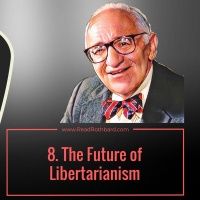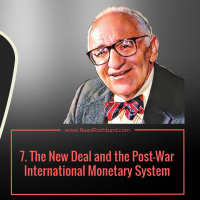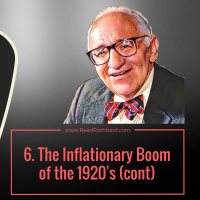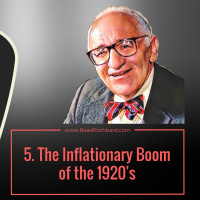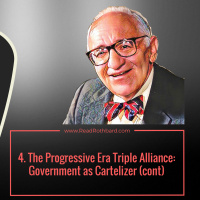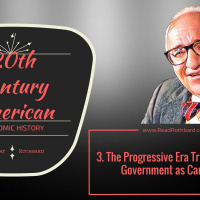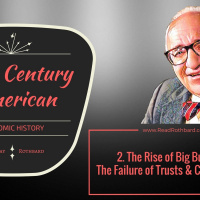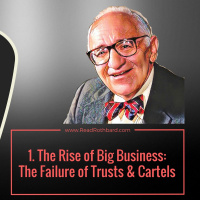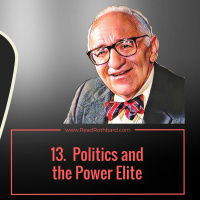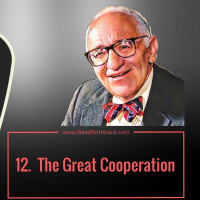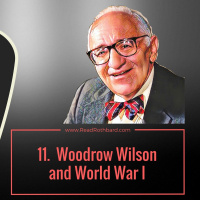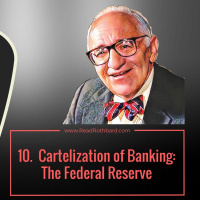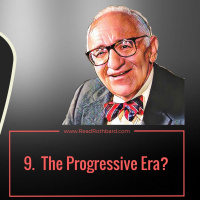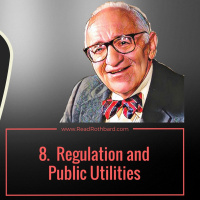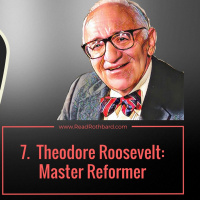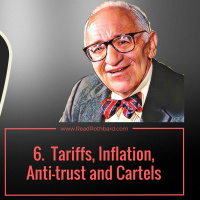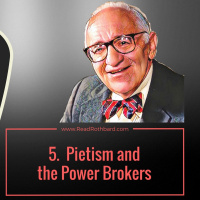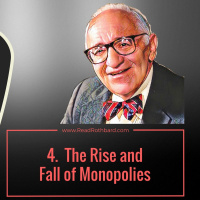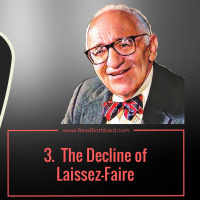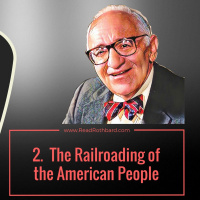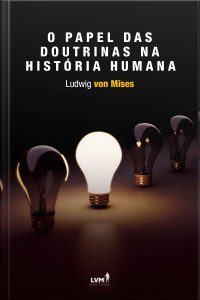Sinopse
Lectures by Austrian Economist and Libertarian, Murray N. Rothbard.Read Rothbard is comprised of a small group of voluntaryists who are fans of Murray N. Rothbard. We curate content on the www.ReadRothbard.com site including books, lectures, articles, speeches, and we make a weekly podcast based on his free-market approach to economics. Our focus is on education and how advancement in technology improves the living standards of the average person.The Read Rothbard Podcast is all about Maximum Freedom. We look at movies and current events from a Rothbardian Anarchist perspective. If it's voluntary, we're cool with it. If it's not, then it violated the Non-Aggression Principle and Property Rights - the core tenants of Libertarian Theory - and hence - human freedom.Website: http://www.ReadRothbard.comiTunes: https://itunes.apple.com/us/podcast/the-read-rothbard-podcast/id1166745868Google Play Music: https://play.google.com/music/m/Ii45fhytlsiwkw6cbgzbxi6ahmi?t=The_Read_Rothbard_PodcastFacebook: http://www.facebook.com/readrothbardclubFlickr: https://www.flickr.com/gp/145447582@N05/xB4583Patreon: https://www.patreon.com/ReadRothbardPresented by Read Rothbard.Read Rothbard is comprised of a small group of voluntaryists who are fans of Murray N. Rothbard. We curate content on the www.ReadRothbard.com site including books, lectures, articles, speeches, and we make a weekly podcast based on his free-market approach to economics. Our focus is on education and how advancement in technology improves the living standards of the average person.The Read Rothbard Podcast is all about Maximum Freedom. We look at movies and current events from a Rothbardian Anarchist perspective. If it's voluntary, we're cool with it. If it's not, then it violated the Non-Aggression Principle and Property Rights - the core tenants of Libertarian Theory - and hence - human freedom.Website: http://www.ReadRothbard.comiTunes: https://itunes.apple.com/us/podcast/the-read-rothbard-podcast/id1166745868Google Play Music: https://play.google.com/music/m/Ii45fhytlsiwkw6cbgzbxi6ahmi?t=The_Read_Rothbard_PodcastFacebook: http://www.facebook.com/readrothbardclubFlickr: https://www.flickr.com/gp/145447582@N05/xB4583Patreon: https://www.patreon.com/ReadRothbard
Episódios
-
Episode 61 - 8. The Future of Libertarianism - Murray N Rothbard
01/05/2017 Duração: 01h23min20th Century American Economic History 8. The Future of Libertarianism Lecture by Murray N. Rothbard Rothbard explains why he is optimistic. The norm of civilization has been despotism and statism. The quantum quality change in history has been the Industrial Revolution from mid-18th Century to mid-19th. Only the free market, libertarian society can expand this viable and moral industrialism. A society without a ruling class results. Peace and a classless society are classical liberal goals. Some individuals seize control of the state apparatus and use taxes to rob the producers. Class conflicts occur because one group in society are tax eaters and the other group are tax payers. Industrialism created so much wealth that cartels and Keynesianism have been able to eat away at the fat. Yet, the cause and effect chain is now much shorter. Shortages resulting from price controls now show up quickly. There is a general revulsion against the state. 8 of 8 from Murray Rothbard's 20th Century American Economic
-
Episode 60 - 7. The New Deal and the Post War International Monetary System - Murray N Rothbard
23/04/2017 Duração: 01h24min20th Century American Economic History 7. The New Deal and the Post War International Monetary System Lecture by Murray N. Rothbard The World Economic Conference of 1933 in London met to deal with America's Great Depression, but, without consulting anyone, FDR declared that the U.S. would not agree to the proposal because he wanted to take the U.S. off the gold standard in order to inflate the dollar. The gold-supporting British and French were horrified; Nazi Germany was delighted. Hitler loved FDR's New Deal. Morgan men continued to hold power positions internationally, creating worldwide inflation. By 1945, Bretton Woods had established the rules for post-war international monetary management. On 15 August 1971, the U.S. brought this system to an end, rendering the dollar a fiat currency. 7 of 8 from Murray Rothbard's 20th Century American Economic History lecture series. Sourced from: https://mises.org/library/20th-century-american-economic-history We are not endorsed or affiliated with the abov
-
Episode 59 - 6. The Inflationary Boom of the 1920s (continued) - Murray N Rothbard
17/04/2017 Duração: 01h04min20th Century American Economic History 6. The Inflationary Boom of the 1920s (continued) Lecture by Murray N. Rothbard Republican policy has always been high tariffs, keeping foreign goods out. But, then the US would lend those countries money to be able to pay for our higher-priced exports. This peculiar foreign-lending scheme included farm goods. Until 1928 there was an enormous foreign lending boom. The stock market collapsed in October 1929. The Federal Reserve Act of 1913 was for inflationary purposes. The banks endorsed acceptance markets for awhile. Morgan men continued to push price stabilization, yet prices in free markets actually fall, benefiting consumers. In 1929 when prices were falling, corporate bigshots wanted prices pushed back up. The entire banking system was toppling by 1933. It should have been allowed to topple, says Rothbard. The European currencies waged war against each other when everybody was off the gold standard. The League of Nations was to get the US off the gold standard
-
Episode 58 - 5 . The Inflationary Boom of the 1920s - Murray N Rothbard
09/04/2017 Duração: 01h07min20th Century American Economic History 5 . The Inflationary Boom of the 1920s Lecture by Murray N. Rothbard The Industrial Revolution and the development of the modern banking system were the two big things that happened in the Eighteenth Century in Britain. Why does the boom-bust cycle emerge? Is the cycle just a natural part of industry, or is it caused by the banking system? The Austrian explanation of expanded bank credit not based upon private pools of savings is sound, unlike the Keynesian explanations of overproduction or under consumption. Inflation is an increase in the money supply. 5 of 8 from Murray Rothbard's 20th Century American Economic History lecture series. Sourced from: https://mises.org/library/20th-century-american-economic-history We are not endorsed or affiliated with the above. https://creativecommons.org/licenses/by-nc-nd/3.0/legalcode Presented by: Read Rothbard and Actual Anarchy Read Rothbard is comprised of a small group of voluntaryists who are fans of Murray N.
-
Episode 57 - 4. The Progressive Era Triple Alliance: Government as Cartelizer (continued) - Murray N Rothbard
03/04/2017 Duração: 01h06min20th Century American Economic History 4. The Progressive Era Triple Alliance: Government as Cartelizer continued Lecture by Murray N. Rothbard The state must invest in human beings the same way you invest in cattle on a farm. This progressive corporatist view was behind the creation of the Rockefeller Foundation. Industrial solutions were to be strictly scientific, e.g. minimum wage laws, public works, and government concentration camps (CCC). The Federal Reserve system followed the national banking system. The free banking system had had the least inflation. Government has had a long history of bailing out big banks that might fail. Benjamin Strong was the head of the Federal Reserve system throughout his life. He was a Morgan man. The Fed had the monopoly to issue cash. Puritanism is the haunting fear that somebody somewhere might be happy. Prohibition was just part of the progressive platforms. 4 of 8 from Murray Rothbard's 20th Century American Economic History lecture series. Sourced from: htt
-
Episode 56 - 3. The Progressive Era Triple Alliance: Government as Cartelizer - Murray N Rothbard
27/03/2017 Duração: 01h27min20th Century American Economic History 3. The Progressive Era Triple Alliance: Government as Cartelizer Lecture by Murray N. Rothbard The progressive period birthed the cancerous growth of the welfare/warfare state, fake capitalism, the middle way, neomercantilism, and the corporate state. Morgan and Rockefeller men warred with each other over many issues and many generations. Effective competition was attacked as government attempted to cartellize business. 3 of 8 from Murray Rothbard's 20th Century American Economic History lecture series. Sourced from: https://mises.org/library/20th-century-american-economic-history We are not endorsed or affiliated with the above. https://creativecommons.org/licenses/by-nc-nd/3.0/legalcode Presented by: Read Rothbard and Actual Anarchy Read Rothbard is comprised of a small group of voluntaryists who are fans of Murray N. Rothbard. We curate content on the www.ReadRothbard.com site including books, lectures, articles, speeches, and we make a weekly podcast
-
Episode 55 - 2. The Rise of Big Business: The Failure of Trusts and Cartels continued Murray N Rothbard
20/03/2017 Duração: 51min20th Century American Economic History 2. The Rise of Big Business: The Failure of Trusts and Cartels continued Lecture by Murray N. Rothbard Despite the drive for monopoly, only oil, sugar and corn products ended up dominated by a particular company. Bigger was not better. Biggest was not best. Smaller and more mobile was more competitive. Major inventions are still coming from small firms. 2 of 8 from Murray Rothbard's 20th Century American Economic History lecture series. Sourced from: https://mises.org/library/20th-century-american-economic-history We are not endorsed or affiliated with the above. https://creativecommons.org/licenses/by-nc-nd/3.0/legalcode Presented by: Read Rothbard and Actual Anarchy Read Rothbard is comprised of a small group of voluntaryists who are fans of Murray N. Rothbard. We curate content on the www.ReadRothbard.com site including books, lectures, articles, speeches, and we make a weekly podcast based on his free-market approach to economics. Our focus is on educ
-
Episode 54 - 1. The Rise of Big Business: The Failure of Trusts and Cartels - Murray N Rothbard
13/03/2017 Duração: 57min20th Century American Economic History 1. The Rise of Big Business: The Failure of Trusts and Cartels Lecture by Murray N. Rothbard In the 19th Century and the beginning of the 20th, the rise of big business on the free market could not create monopolies and cartels. Only government could do that. Government tried. Government failed. 1 of 8 from Murray Rothbard's 20th Century American Economic History lecture series. Sourced from: https://mises.org/library/20th-century-american-economic-history We are not endorsed or affiliated with the above. https://creativecommons.org/licenses/by-nc-nd/3.0/legalcode Presented by: Read Rothbard and Actual Anarchy Read Rothbard is comprised of a small group of voluntaryists who are fans of Murray N. Rothbard. We curate content on the www.ReadRothbard.com site including books, lectures, articles, speeches, and we make a weekly podcast based on his free-market approach to economics. Our focus is on education and how advancement in technology improves the living
-
Episode 53 - American Economy and the End of Laissez-Faire - 13 of 13 - Politics and the Power Elite
18/02/2017 Duração: 52minThe American Economy and the End of Laissez-Faire: 1870 to World War II 13. Politics and the Power Elite Lecture by Murray N. Rothbard With WWII, Morgans get their war in Europe; Rockefellers get their war in Asia. Both sides are happy. Rockefellers take over foreign relations and create the Trilateral Commission, while electing Carter President in 1977. Coolidge had an entire Morgan cabinet. More Morgan men under Roosevelt. Central banks were set up in each country. Deliberate inflation prevented the loss of gold from certain countries. Hoover was the first New Dealer. Roosevelt in 1932 simply expanded it. The National Recovery Association was a creation of the Hyde Park group. The Roosevelts were closely connected to the wealthy Astors. Rockefeller men began replacing Morgan men. The Harrimans were connected to these power elites,running banking interests. Kuhn, Loeb & Co., Goldman Sachs and Lehman Brothers took over investment banking. Major differences are now between the Eastern establishment (cult
-
Episode 52 - American Economy and the End of Laissez-Faire - 12 of 13 - The Great Cooperation
16/02/2017 Duração: 01h29minThe American Economy and the End of Laissez-Faire: 1870 to World War II 12. The Great Cooperation Lecture by Murray N. Rothbard Public housing, planned cities, government power plants, and coerced unionism were all part of the great cooperation between corporations and government through WWI and WWII. Milton Friedman proposed the withholding tax in WWII. Statistics came into being. Cartels were created to manage many industries, e.g. railroads and food. Unions were pro-war forces. Fascism was considered great. Civil liberties were dropped. Coolidge continued as a Morgan man. Lecture 12 of 13 presented in Fall of 1986 at the New York Polytechnic University. This lecture on YouTube: https://youtu.be/VIaOuSt13v0 Sourced from: https://mises.org/library/american-economy-and-end-laissez-faire-1870-world-war-ii We are not endorsed or affiliated with the above. https://creativecommons.org/licenses/by-nc-nd/3.0/legalcode Presented by: Read Rothbard is comprised of a small group of voluntaryists who are
-
Episode 51 - American Economy and the End of Laissez-Faire - 11 of 13 - Woodrow Wilson and World War I
14/02/2017 Duração: 01h27minThe American Economy and the End of Laissez-Faire: 1870 to World War II 11. Woodrow Wilson and World War I Lecture by Murray N. Rothbard Where did Benjamin Strong - head of the Fed - come from? Rothbard continues to reveal the individuals who shaped our world and wars. Morgan's empire brought us the irrational and useless WWI. Foreign policy today rests upon this Morgan outlook. The Versailles Treaty was a harsh thoughtless division of lands and economies. Many powerful politicians get their start under Wilson. Roosevelt and Hoover were both progressive Wilsonians. 1913 gave us the Fed and the income tax. Lecture 11 of 13 presented in Fall of 1986 at the New York Polytechnic University. This lecture on YouTube: https://youtu.be/JmZ5Lcad3Mk Sourced from: https://mises.org/library/american-economy-and-end-laissez-faire-1870-world-war-ii We are not endorsed or affiliated with the above. https://creativecommons.org/licenses/by-nc-nd/3.0/legalcode Presented by: Read Rothbard is comprised of a smal
-
Episode 50 - American Economy and the End of Laissez-Faire - 10 of 13 - Cartelization of Banking: The Fed
11/02/2017 Duração: 01h27minThe American Economy and the End of Laissez-Faire: 1870 to World War II 10. Cartelization of Banking: The Fed Lecture by Murray N. Rothbard Bernard Baruch ran WWI as an absolute collectivist controller. The Federal Reserve was created in 1913 by Morgan men to cartelize the banking system and limit competition. Production and prices were regulated via the corporate state. Morgan men wrote the FTC- Federal Trade Commission Act. Progressive means statist and corporatist. The New Republic, a proto fascist magazine- appeared. Banks create fake warehouse on-demand receipts. One was a note, but the more sophisticated way was by having open-book accounts by which you have a demand deposit, not a bank note. The check is a transfer order and the temptation for counterfeiting fake warehouse receipts was great. This is fractional reserve banking. Rothbard thinks it is fraud. It increases the money supply in an inflationary manner by creating money out of thin air. All banks are technically insolvent. The Central bank
-
Episode 49 - American Economy and the End of Laissez-Faire - 9 of 13 - The Progressive Era
09/02/2017 Duração: 01h27minThe American Economy and the End of Laissez-Faire: 1870 to World War II 9. The Progressive Era? Lecture by Murray N. Rothbard Progressive movement came in in 1900 to eliminate political parties. Technocrats and bureaucrats take over political power. Rural versus urban. Eliminate mayors, eliminate voting altogether, have appointed bureaucrats only. Nationalize public school system so costs could be socialized, like getting the public schools to teach Spanish. Children can all be part of a collective, without parental influence. Control shifted from ethnic working class small communities to upper class WASPS. Only synthetic drugs remained legal in medicine. Rockefeller Institute backed it. Homeopathy was outlawed. Hospitals overused fancy equipment and cared about just the doctors not the patients. The Progressive party was created by JP Morgan interests. Lecture 9 of 13 presented in Fall of 1986 at the New York Polytechnic University. This lecture on YouTube: https://youtu.be/8EW_jPJzEK4 Sourced from:
-
Episode 48 - American Economy and the End of Laissez-Faire - 8 of 13 - Regulation and Public Utilities
07/02/2017 Duração: 02h56sThe American Economy and the End of Laissez-Faire: 1870 to World War II 8. Regulation and Public Utilities Lecture by Murray N. Rothbard State dominated cartels used intellectuals as apologists for the government. Big unionism was to transmit orders to the working class. Public utilities were government monopolies for fifty year terms, run without any checks by the public. It is the function of government to run everything. Regulation was rampant, e.g. prohibition. Social workers wanted to abolish the saloons. German brewers were suspect of weakening soldiers. Constitutional amendment outlawed liquor. Lecture 8 of 13 presented in Fall of 1986 at the New York Polytechnic University. This lecture on YouTube: https://youtu.be/p09wxsT3g5o Sourced from: https://mises.org/library/american-economy-and-end-laissez-faire-1870-world-war-ii We are not endorsed or affiliated with the above. https://creativecommons.org/licenses/by-nc-nd/3.0/legalcode Presented by: Read Rothbard is comprised of a small group
-
Episode 47 - American Economy and the End of Laissez-Faire - 7 of 13 - Theodore Roosevelt Master Reformer
04/02/2017 Duração: 01h02minThe American Economy and the End of Laissez-Faire: 1870 to World War II 7. Theodore Roosevelt: Master Reformer Lecture by Murray N. Rothbard Assassinations in American are only by lone nuts. No one who benefits is ever suspected, like Lyndon Johnson. The progressive period saw a re-alliance of church and state - secularized extreme Pietism (Protestant sects) with government as savior by intervening in markets. Meat packing regulations and the Sugar Trust under Teddy Roosevelt, passed in June 1906. The myth was that the meat was diseased and people were dying of it. That was false. The big meat packers were asking for regulations because they wanted to sue their small competitors. The Pure Food and Drug Act was a prototype for the whole progressive movement toward purity of body, mind and soul. Adulteration only meant any change in the name of the sugar chemistry. Lecture 7 of 13 presented in Fall of 1986 at the New York Polytechnic University. This lecture on YouTube: https://youtu.be/IaxuwpUpKeA Source
-
Episode 46 - American Economy and the End of Laissez-Faire - 6 of 13 - Tariffs, Inflation, Anti Trust and Cartels
02/02/2017 Duração: 01h47minThe American Economy and the End of Laissez-Faire: 1870 to World War II 6. Tariffs, Inflation, Anti-Trust and Cartels Lecture by Murray N. Rothbard The Sherman Act outlawed restraint of trade. The Clayton Act added to that. Anti-Trust hysteria came in the 1940-50s. Whatever you did would be considered monopolistic. The charges didn't come from consumers, they came from whining competitors. It was government-enforced blackmail. The US leather industry was put out of business. The corn starch industry was put out of business. Retail cartels, enforced by the government, imposed artificially higher prices on products. It was the welfare state in action. Claims of economic privilege were whipped up by racial and ethnic claims. Teddy Roosevelt is my least favorite person. He liked killing. Lecture 6 of 13 presented in Fall of 1986 at the New York Polytechnic University. This lecture on YouTube: https://youtu.be/-Ine69dwMz4 Sourced from: https://mises.org/library/american-economy-and-end-laissez-faire-1870-w
-
Episode 45 - American Economy and the End of Laissez-Faire - 5 of 13 - Pietism and the Power Brokers
31/01/2017 Duração: 02h13minThe American Economy and the End of Laissez-Faire: 1870 to World War II 5. Pietism and the Power Brokers Lecture by Murray N. Rothbard When pietists shift to the Republican party, they form the progressive movement of 1900-1920. Rockefeller- McKinley forms alliances with power brokers like Kuhn, Loeb & Co., and Harriman (versus the Morgans). Teddy Roosevelt (Oyster Bay wing of the family) was financially in with the Morgans. The Panama Canal caper included a fake revolution in Panama in order to give more U.S. money to the French canal company, whose shares were owned by a Morgan group. In industry, iron and steel found double protection through tariffs and greenback inflation. Morgan tried to establish cartels, but failed. The iron and steel companies then turned to government to do it for them- a progressive move. Lecture 5 of 13 presented in Fall of 1986 at the New York Polytechnic University. This lecture on YouTube: https://youtu.be/2K2u82fMXE8 Sourced from: https://mises.org/library/america
-
Episode 44 - American Economy and the End of Laissez-Faire - 4 of 13 - The Rise and Fall of Monopolie
28/01/2017 Duração: 02h03minThe American Economy and the End of Laissez-Faire: 1870 to World War II 4. The Rise and Fall of Monopolies Lecture by Murray N. Rothbard Petroleum entered the industrial scene in 1859 with John D. Rockefeller's hard work. As the first manufacturing corporation, Standard Oil created a monopoly in kerosene refining by buying others out. A huge drop in the price of fuel followed, benefiting consumers, due to production efficiencies. Rothbard, then, discusses pietists, prohibitionists and the big political shift of 1896. Pietists, prohibitionists, anti-immigrationists, and women suffragettes had made a big Republican drive before 1890. But then a big, sudden shift in politics occurred, with Democrats capturing the big Midwest states, due to demographics of Germans, higher birth rates, anti-prohibitionists, and hard money standards. After this, the Republican party got more moderate and the Democratic party got captured by extreme pietists in 1896. The South became a fully Democratic region. The Panic of 1893
-
Episode 43 - American Economy and the End of Laissez-Faire - 3 of 13 - The Decline of Laissez-Faire
26/01/2017 Duração: 02h04minThe American Economy and the End of Laissez-Faire: 1870 to World War II 3. The Decline of Laissez-Faire Lecture by Murray N. Rothbard Economics is a constant fight between the market and the government. The railroad cartel did not work against the free market even with ideal conditions. Airlines were tightly regulated until the small airlines began to compete in quality. Deregulation followed. Cleveland deviated from laissez-faire because of Morgan interests. After the Civil War, manufacturing thrived - our own Industrial Revolution was underway. Prices fell. Savings rose. Capitalists owned the machinery so the workers no longer had to. The factory system enormously increased productivity. Corporations are legitimate as libertarian entities. Industry made petroleum a natural resource. Lecture 3 of 13 presented in Fall of 1986 at the New York Polytechnic University. This lecture on YouTube: https://youtu.be/eHmu2nQ7fu8 Sourced from: https://mises.org/library/american-economy-and-end-laissez-faire-1870
-
Episode 42 - American Economy and the End of Laissez-Faire - 2 of 13 - The Railroading of the American People
24/01/2017 Duração: 01h32minThe American Economy and the End of Laissez-Faire: 1870 to World War II 2. The Railroading of the American People Lecture by Murray N. Rothbard The railroads experienced both enormous growth and enormous government intervention. Land was closed off from settlement, causing farmers to oppose the privileged railroads. Markets were skewed. Waste and inefficiencies were high. Graft and corruption were rampant. Only the Great Northern by James Hill was built with private monies. It became the of the few transcontinental railroads not to go bankrupt. Lecture 2 of 13 presented in Fall of 1986 at the New York Polytechnic University. This lecture on YouTube: https://youtu.be/EypkF60gW_4 Sourced from: https://mises.org/library/american-economy-and-end-laissez-faire-1870-world-war-ii We are not endorsed or affiliated with the above. https://creativecommons.org/licenses/by-nc-nd/3.0/legalcode Presented by: Read Rothbard is comprised of a small group of voluntaryists who are fans of Murray N. Rothbard. We c

